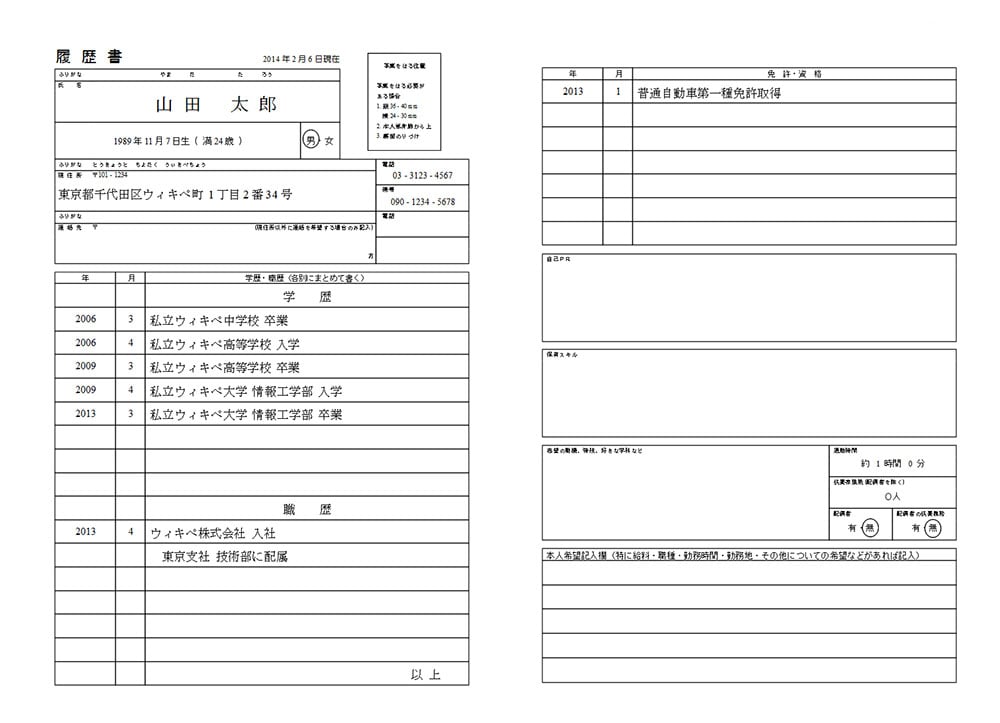
Part-time work in Japan presents numerous benefits for students. Firstly, it provides a financial cushion, helping to cover living expenses and tuition fees. This financial independence can be empowering for students, fostering a sense of responsibility and maturity.
Moreover, part-time jobs offer a practical way to enhance language skills, especially in Japanese. Regular interaction with locals in a work environment accelerates language proficiency, a skill that is invaluable both academically and professionally.
Apart from linguistic skills, part-time work also hones professional skills. Students learn time management, teamwork, and adaptability — competencies that are highly regarded in the professional world. This experience can significantly boost a student’s resume, giving them a competitive edge in their future career endeavors.
Additionally, part-time jobs provide a unique insight into Japanese culture. Students get to experience the work ethics, customs, and societal norms firsthand, which is a rich educational experience beyond the confines of a classroom.
The Importance of Finding the Right Job for a Student’s Schedule and Interests
While part-time work in Japan offers numerous benefits, it’s crucial for students to find the right job that aligns with their schedule and interests. The right job can enhance the overall study abroad experience, while the wrong one can become a source of unnecessary stress.
Aligning Work with Academic Schedule
The primary focus of a student should always be their studies. Therefore, it’s essential to find a job that fits well with their academic schedule. A job with flexible hours or one that is understanding of a student’s academic commitments is ideal. This alignment ensures that work does not interfere with the primary purpose of being in Japan – education. Students should seek out employers who are accustomed to hiring students and are, therefore, more likely to be sympathetic to their academic needs, especially during periods of exams or heavy coursework.
Matching Job with Personal Interests and Career Aspirations
Finding a job that aligns with personal interests or career aspirations can significantly enhance the part-time work experience. For instance, a student interested in the culinary arts might find a part-time job in a Japanese restaurant both enjoyable and educational. Similarly, those pursuing degrees in business or technology might benefit from positions in retail or tech companies.
Such alignment not only makes the job more enjoyable but also more valuable from a career development perspective. It provides practical experience in a field of interest and can often lead to networking opportunities and professional growth.
Cultural and Language Integration in a New Country
Part-time jobs can also serve as an excellent platform for culture and language integration. For students aiming to learn Japanese, working in a local environment provides daily practice and immersion. It’s an opportunity to learn the language in practical, real-world situations, which is often more effective than classroom learning alone.
Understanding the Legal Aspects of Working in Japan Part-time
Navigating the legal landscape of part-time work in Japan is crucial for international students to ensure they stay compliant while benefiting from work opportunities. Japan’s laws are designed to protect students and encourage that their primary focus remains on their education. Understanding these laws helps in making informed decisions and avoiding any legal complications.
International students in Japan are subject to specific legal restrictions and regulations regarding part-time work. The most fundamental requirement is possessing a valid student visa and a “Permission to Engage in Activity other than that Permitted under the Status of Residence Previously Granted.” This permission is essential as it legally allows students to take up part-time jobs alongside their schooling.
There are also restrictions on the type of work foreign students can undertake. Jobs that negatively affect public morals, such as working in gambling establishments or in the adult entertainment industry, are strictly prohibited. Additionally, students must ensure that their part-time work does not interfere with their studies, as their student visa’s primary purpose is education.
Researching Job Opportunities
For international students in Japan, understanding the legal framework for part-time work is just the first step. The next, and often more challenging task, is finding the right employment opportunities that fit their schedule, interests, and legal boundaries. Here are some effective ways to conduct this research, keeping in mind the long-term goals and specific needs of foreign students.
Utilizing Job Boards and Websites for Part-time Work
The digital age has significantly eased the job hunting process. Numerous websites and online job boards are specifically tailored for part-time work opportunities for students in Japan. Sites such as Jobs in Japan are particularly useful for foreign students who may not have fluency in Japanese, as they often feature positions in English-speaking roles or those seeking international workers.
These platforms also allow students to filter job opportunities based on various factors, such as location, industry, and work hours. This is especially helpful for those seeking long-term employment that aligns with their academic schedules and career aspirations. Additionally, some sites provide resources and advice on working in Japan, including essential tips on resume writing and job interviews tailored for the Japanese market.
Networking and Recommendations from Peers and Professors
Networking remains a powerful tool in the search process. Fellow students, especially those who have been in Japan longer, can be invaluable sources of information on where and how to find part-time employment. Their insights can be particularly beneficial for foreign students who are navigating the job market for the first time. They can also provide information about unpaid internships or volunteer opportunities, which, while not providing immediate financial benefits, can be instrumental for long-term career development and language fluency.
Professors and academic advisors are also crucial resources. They can offer information about new openings that are directly related to a student’s field of study. As a provider of academic guidance, they can also recommend positions that align with the student’s course and career goals, ensuring that the job complements their long-term academic and professional objectives.
On-campus Opportunities and Student Organizations
Japanese universities often offer part-time job opportunities on campus. These can range from assisting in the university library, cafeterias, or administrative offices. On-campus positions are ideal for students as they tend to be more flexible with academic schedules and are conveniently located.
Additionally, Japanese Language Schools often have information on part-time job opportunities. These organizations understand the unique challenges faced by international students and can provide job connections, support, and guidance.
Part-time working Hours and Prohibited Job Types for Student Visa Holders
The Japanese government, through its Ministry responsible for labor and immigration, has established clear guidelines on the maximum number of working hours for international students. During the academic term, students are eligible to work up to 28 hours per week. This restriction is designed to ensure that part-time work does not impede academic progress. During extended holiday periods, such as summer or winter breaks, this limit is extended to 40 hours per week.
It’s important for students to find employment that respects these limits, as exceeding them can have serious consequences, including the possibility of visa revocation. Students should regularly check for any updates or changes to these regulations, as the legal landscape can evolve.
Prohibited Job Types and Employment Sectors
When it comes to the types of jobs international students can undertake, the Japanese government has set specific restrictions to protect public morals and the interests of foreign workers. Students are generally free to explore a wide range of employment options across various sectors, but they are advised to avoid anything that may conflict with these moral guidelines.
Furthermore, students who are not yet fluent in Japanese should be cautious about accepting an offer that requires high levels of language proficiency. Miscommunication in such roles can lead to misunderstandings and potential legal issues. This is particularly important in sectors that heavily interact with the public or in roles that require precise communication.
In conclusion, the experience of working part-time in Japan can be great for international students, offering them a chance to immerse themselves in the culture and gain valuable life experience. However, it’s essential to stay informed and adhere to the legal guidelines set by the Japanese authorities. Regular consultation with the latest guidelines from the Japanese immigration ministry or advice from educational institutions will help ensure that students enjoy their work experience while maintaining their student visa status.
Crafting a Japanese-style Resume

For students aiming to secure part-time work in Japan, understanding and mastering the Japanese-style resume is crucial. Japanese resumes, known as ‘rirekisho,’ have a unique format and content style, differing significantly from Western resumes. Here’s how to navigate this important aspect of job applications in Japan.
While the standard expectation in Japan is to submit a rirekisho, there are exceptions, particularly when applying to foreign companies or positions that primarily require English proficiency. In such cases, you may be asked to provide a resume in English. However, these instances are relatively rare, and for most part-time job applications in Japan, especially those in Japanese companies or industries, proficiency in filling out a rirekisho is essential.
It’s a critical skill for students to master, as it demonstrates adaptability and respect for local business practices.
The Unique Format and Content of a Japanese Resume
The Japanese resume typically follows a very structured format, often filled out by hand. Standard rirekisho templates, which can be purchased at stationery stores or downloaded online, are used universally across Japan. These templates include specific sections and are usually printed on traditional Japanese resume paper.
Key components of a rirekisho include:
- Personal Information: This section covers basic details like name, date of birth, gender, and contact information. Unlike Western resumes, a photo is often required, and it should be a professional headshot.
- Educational Background: In this section, list your educational history, starting from high school, regardless of your current level of schooling.
- Work Experience: Similar to Western resumes, detail your previous work experiences. However, in Japan, the emphasis is on the order of the jobs rather than the skills acquired.
- Certifications and Skills: Any relevant certifications, language skills (especially Japanese language proficiency), and technical skills should be included here.
- Reason for Applying: This is a unique feature of the Japanese resume, where you briefly state your reason for applying to the position.
- Personal Interests and Hobbies: Sometimes included, this can provide a more rounded picture of you as a candidate.
Tailoring Your Resume for Part-Time Work in Japan
When crafting a resume for part-time work in Japan, it’s important to tailor it to the specific position and demonstrate how your experience and skills make you a suitable candidate.
- Highlight Relevant Experience: If you have previous part-time work experience, especially in a similar field, make sure to promote it. Demonstrate any transferable skills that could be beneficial for the job.
- Language Skills: If you have Japanese language skills, even if basic, include them. Employers appreciate candidates who can communicate in Japanese, as it often eases interactions with colleagues and customers.
- Cultural Awareness: Displaying an understanding of Japanese culture and professional ethics can be a plus. This shows potential employers that you are adaptable and respectful of the workplace environment in Japan.
- Clarity and Conciseness: While it’s important to be thorough, ensure your resume is clear and concise. Stick to the standard format and avoid overly creative layouts or informal language.
- Proofreading: Ensure there are no errors in your resume. If your Japanese skills are not advanced, seek help from a native speaker or use professional services to ensure accuracy.
Navigating the Application Process
After preparing a Japanese-style resume, the next crucial step for students is to navigate the application process for part-time jobs in Japan. This process is not just about applying for jobs; it involves understanding and adapting to the cultural norms and expectations of Japan. Here’s a guide to help international students through this journey.
Navigating the application process for part-time work in Japan requires not just an understanding of the job role but also an awareness of the cultural nuances of the country. Here’s how to approach this process effectively.
1. Application Submission
When submitting your application, including your rirekisho, ensure that you follow the instructions provided in the job posting meticulously. Attention to detail is crucial in this stage, as it reflects your ability to adhere to Japanese workplace norms. Companies may also evaluate your application based on how well you understand and align with their business practices.
2. Interview Preparation
Prepare thoroughly for interviews. Research the company to understand its culture and the role you are applying for. Show initiative by thinking about how your skills and experiences make you a suitable candidate for the position. Highlight any qualifications or experiences that can be beneficial to the position and demonstrate your interest in the company’s development and success.
3. Professional Attire
Dress appropriately for interviews, which typically means a suit and a conservative appearance. In Japan, first impressions are critical, and professional attire is a significant part of this, especially when you are representing yourself as a potential employee in a new country.
4. Interview Etiquette
Be punctual, polite, and show respect to the interviewer. Use formal language and remember to bow as a sign of respect, as is customary in Japan. Be prepared to discuss your resume in detail, focusing on why you are interested in working with their company and how your background aligns with the position.
5. Communication Skills
Effective and respectful communication is highly valued. Even if you are yet to attain fluency in Japanese, showing a willingness to learn and making an effort in communication is appreciated. This demonstrates your initiative and commitment to integrating into the company’s environment and the country’s work culture. Express your eagerness to expand your Japanese skills, as this can be a key qualification in certain roles.
Understanding Cultural Norms and Expectations
- Respect and Humility: Japanese culture values respect, humility, and harmony. Show respect in your interactions, avoid aggressive self-promotion, and be willing to listen and learn.
- Group Harmony: Understand that Japanese workplaces often prioritize group harmony over individual achievement. Express your willingness to be a team player and contribute positively to the work environment.
- Attention to Detail: Japanese culture places a high value on attention to detail. Show that you are meticulous and thorough in your approach to tasks.
- Flexibility and Adaptability: Be open to learning and adapting to new ways of working. This shows your respect for Japanese work culture and your ability to integrate into different work environments.
Balance is an Essential Requirement
Successfully securing a part-time job in Japan is just the beginning. The real challenge for international students lies in effectively balancing this work with their academic responsibilities. This balance is crucial not only for academic success but also for maintaining a healthy lifestyle and avoiding burnout. Here are some strategies and tips to help students navigate this delicate balance.
Balancing a part-time position with academic responsibilities can be challenging, especially for students learning in another country or pursuing a graduate degree. However, with the right strategies and mindset, this balance can be successfully achieved. Here’s how:
1. Prioritize Time Management
Develop a structured schedule that clearly delineates time for work, academic commitments, and personal activities. Utilizing tools like calendars or digital planners is essential to keep track of your commitments and deadlines. Be mindful of the tendency to overcommit, especially if you’re studying in another country and adjusting to a new destination. Time management becomes even more crucial in these scenarios.
2. Communicate with Employers
Be upfront with your employer about your status as a student, especially if you are a graduate student or studying abroad. Many employers are willing to offer flexible schedules or reduced hours, particularly during critical academic periods like exam seasons. This understanding is vital to prevent situations where you might have to work overtime or longer hours that could conflict with your academic responsibilities.
3. Stay Organized
Maintaining organization is key, especially when managing the demands of work and academic responsibilities simultaneously. Keep your academic and work materials well-organized. This approach not only minimizes the time spent searching for items but also helps in maintaining a clear mind and focus, which is especially important when working towards a graduate degree or learning in a foreign destination.
4. Use Travel Time Wisely
If your part-time job or university is at a distance, use your travel time productively. This could involve reviewing notes or catching up on readings while riding on the bus or train. Effectively transforming a commute into a productive part of your day. This strategy can be particularly beneficial for graduate students or those studying abroad, who might find themselves navigating longer commutes.
5. Seek Academic Support
Don’t hesitate to use your university or language school’s resources, such as tutoring services or student groups, to stay on top of your academic load. These resources can be a lifeline, especially when juggling strict academic schedules with work commitments. For students studying abroad, these support systems can also provide valuable guidance in adjusting to different academic environments.
As we’ve explored in this article, finding a suitable part-time job as a student in Japan offers much more than just financial benefits. It’s an opportunity to gain real-world experience, develop valuable skills, and immerse oneself in Japanese culture. Part-time work can significantly enrich your student life, providing both a means of support and a platform for personal and professional growth.
We encourage students to actively explore and take advantage of the myriad opportunities available for part-time work in Japan. Each job opportunity presents a unique experience, offering insights into the Japanese way of life and enhancing your understanding of the local culture and language. The right part-time job can seamlessly complement your academic pursuits and open doors to future career opportunities.
Remember, the journey of working part-time in Japan is not just about earning money; it’s about the invaluable experiences and learnings you gain along the way. So, embrace these opportunities with an open mind and a willing heart, and make the most of your time as a student in Japan.














